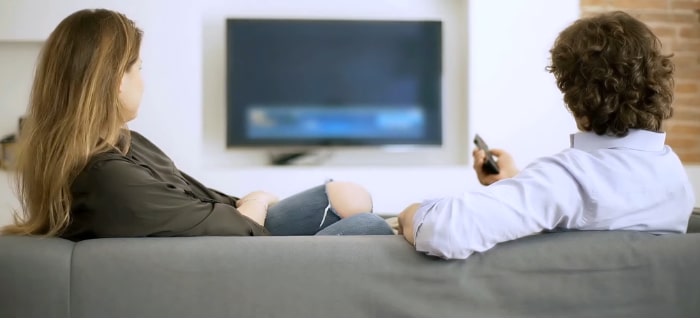Do you ever face issues while watching television, such as break-ups, pixelation, or TV loses signal same time every day?
If you do, it means some kind of interference might happen with your TV antenna and its signal.
Interferences can happen for a number of reasons. It’s a very known problem that antennas face. You need to understand why this is happening to fix the issue.
Now, what causes interference with TV antenna? Interferences happen when there are electromagnetic waves around the antenna.
However, a TV antenna often faces many problems because of an old or broken antenna, wiring, or connections.
So when you face antenna issues, make sure to check these things first. Also, ask the neighbors if they’re having the same kind of issues.
Causes of Interference with TV Antenna

Antenna users wonder, “why does my tv signal go in and out?” it could be because of interferences with the antenna.
There are a few reasons this can happen. Let’s explore these reasons in detail.
Distance
Antenna location is essential. Your TV antenna needs to be close to the cell tower to receive a strong signal. So, if your antenna is far from any transmitters, issues and interferences may occur.
Being far can cause a digital cliff. This means that your signal can drop off suddenly. Why does this happen? It does because broadcasting transitions from analog to digital.
Regarding the distance between an analog antenna and the transmitter, the more the distance, the more faded the signal gets.
With distance, it’s still possible to get some signal. However, you’ll only get a low-quality signal that will produce a fuzzy image. It’s up to you if you’re okay with that or not.
On the other hand, digital transmissions of TV signals don’t gradually fade over distance, which people use more nowadays. With these signals, you get great-quality images at all times. And when you get to the digital cliff, images look blocky or discontinue and then come back.
However, if you get too close to the transmitter with your antenna, your DTV converter box or TV tuner might get overpowered and even get damaged.
Type of Antenna
An area can have multiple station transmitters that aren’t positioned in the same place. Different transmitters can transmit from different directions, such as the North, the East, or the West.
This is called a directional antenna. Other antennas, like omnidirectional or multi-directional antennas, can cause TV antenna interference.
Obstacles
“Why do I lose some antenna channels at night?” – this is a common problem that physical obstacles might cause by interfering with the TV antenna signals. These obstacles can be trees, hills, or even buildings.
Buildings may use materials like stucco, aluminum siding, foil-lined ducts, solar panels, concrete, metal roofs, and conduits for construction purposes. An attic antenna or an indoor antenna gets interfered with by these materials.
Some electrical equipment might face interference from weather conditions like rain or wind and cause issues with a TV signal. Even the curvature of the Earth could cause interferences at long distances.
Sensitivity of a TV Tuner
TV-tuners can be pretty sensitive. Their sensitivity can also be the root cause of a weak signal because of its interference.
Utilizing the Same Antenna
Sometimes people connect multiple TVs to the same antenna with a splitter. If you’re doing this, you’ll surely get a weak signal because this creates a cliff effect.
So, if you connect three or four of your TVs to one antenna, while one or two of those TVs may receive a good signal, the others might not even receive any.
Transmitter Interference
Different transmitters, like radio stations, CBs, TV stations, and amateur radios, can cause interference. This could be the fault of the design, such as frayed wires, inadequate shielding, or insufficient filtering.
Interference at Home
If your neighbors aren’t facing similar TV signal issues as you are, you might want to look into your home for the source of interference.
Things like hair dryers, electric drills, smartphone chargers, light bulbs, computing devices, clothes dryers, LED lights, sewing machines, doorbell transformers, power supplies, cell phones, cordless phones, power tools, light switches, washing machines, fluorescent lights, and garage door openers might cause interference.
Improving Your TV Antenna Signal

How to fix TV interference? “Prevention is better than cure. So you should look into ways of improving your antenna signal.Now that you know what causes these interferences, you should follow these steps to improve your TV antenna signal.
Removing Obstacles
You should remove any physical obstacles between your TV antenna and the transmitter. Make sure that your antenna faces the TV transmitter without any obstacles in the way.
Checking and Replacing Antenna Connections
First, you must check your TV and antenna connections to ensure they aren’t fraying.
An outdoor antenna and antenna cable can wear out over time because of the elements, whereas pets can chew your indoor TV antenna and its cables.
The terminals or antenna connections can rust, and the cables can get cuts or breaks. Look for rusting terminals and cuts on your cable. Don’t forget to check the entire cable length except for the part in the wall, as you can’t get to it.
If you have an analog cable like the 20 American Wire Gauge ( AWG), replace them with an 18 AWG RG6 cable, which is much thicker.
RG6 works better with digital signals because it can support long-distance runs, wider bandwidth, and even do well outdoors.
Depending on the length and brand of the cable, the cost will vary. However, you can purchase a 3-foot-long or a 6-foot-long cable for just a few dollars.
Running Channel Scans
After you’re done checking the connections and placement of your antenna, you should run a channel scan.
To do this, you must open the setup menu of your DTV converter box or TV. You may find new channels that weren’t added before. And you can watch those channels if any station registers.
Using a Rotor
If your outdoor antenna receives signals from multiple directions, you should consider adding a rotor to your antenna. But, it can be an expensive remedy, as these kits can set you back $100-$200.
Direct your antenna to newer channels and put those channels manually into your channel listings if you already know the locations of your transmitters.
Moving the Antenna
You can use rotors for outdoor antennas. But, if you have an indoor antenna, you need to move them on or near a window to avoid wall construction materials interfering with your TV signal.
Make sure that you place your antenna as high as possible for you. And you can use a signal amplifier to strengthen your signal if your cable is too long.
Using Amplifiers
You need to use signal amplifiers between your antenna and your TV if your signal is weak or you can’t receive signals. This can even help with low-sensitivity DVT COnverter boxes and TV tuners.
Connect your antenna’s cable to the amplifier’s input and the amplifier’s output to your antenna’s input. Then, plug in your amplifier.
Using Distribution Amplifiers or Separate Antennas
As you know, using a single antenna for multiple TVs with a splitter can weaken your signal. This gets worse if the distance between the cable from the TVs and the splitter is long.
So you should use separate antennas for every single TV. However, you can simplify the remedy using a distribution amplifier.
Connect the input of the amplifier to the antenna’s main feed and the amplifier’s output to the TVs. This way, your signal will remain strong.
Getting an Attenuator
Your DTV converter box or TV tuner will overpower if your antenna is too close to your transmitter. Try using an attenuator to remedy this situation.
Final Words
What causes interference with TV antenna? Electrical interference might occur because of different electrical equipment and could weaken your digital TV signal quality.
You’ll always want your antenna reception to work efficiently. But, for that, you need to improve your antenna and its connections.
Hopefully, you know now what to do to avoid situations like loss of signal reception and cause reception issues.
